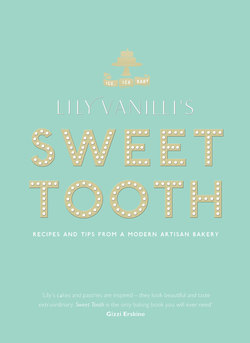Читать книгу Lily Vanilli's Sweet Tooth - Lily Jones - Страница 7
На сайте Литреса книга снята с продажи.
ОглавлениеINTRODUCTION.
For a long time baking was a hobby, until one summer, unable to find a job and fast running out of savings, I started selling a few cakes I’d made in my home kitchen at a small market in East London. The pitch cost me £10, and I’d come home with £30 or £40 each week. It was a way to make a bit of extra cash; I had no expansion plans, no loan, no projected sales and no PR. I never did make more than £40 in a week at Swanfield market, but my cakes were noticed by a food writer for The Times. She wrote an article that was published in February 2009, and Lily Vanilli was born. Since then I have supplied Harrods with cakes, tarts and brownies, made canapés for Elton John’s ‘White Tie and Tiara Ball’, made a cake sculpture that was displayed at the V&A (spiced dark chocolate with grapefruit mousse and Buck’s Fizz curd) and opened the Lily Vanilli Bakery on Columbia Road in East London, which now employs a staff of seven. From those few little cakes I used to sell at Swanfield market, our bakery is now producing hundreds of pies, tarts, sausage rolls, ice creams and cakes every week. During the week we use the space to make bespoke cake sculptures, sweet canapés and bake for private orders, and every Sunday we open our doors to hundreds of locals and tourists visiting the famous East End flower market.
I have no formal training or background in food; my real passion for baking grew from a simple desire to make myself perfect desserts. I’ve always thought that if I’m going to eat something as indulgent as cake it ought to be exactly how I like it, with just the right balance of sweet, light, nutty or fruity. For this reason my recipes are always evolving, or changing with the seasons – like my carrot cake, which changes between summer and winter (as the days get shorter, I’ll make it richer and spicier, with healthy amounts of brandy – see pages 58–59 for the recipe). Everything I know about baking I have learned through trial and error, through reading and practice. Because I’m self-taught, I have always been free to experiment, applying my own touches to recipes and preparing cakes, biscuits and pies with ingredients I have to hand, or that catch my eye in the shop. My vanilla and pomegranate cake, which won Gold at the Great Taste Awards, would never have come about if I hadn’t had a beautiful ruby red pomegranate sitting cut open on the kitchen counter one morning. Baking can be a great way to express yourself, and if you treat it this way, your baking will always be unique. The food you make should be adapted to suit your taste or the tastes of the people you are baking for. When baking for friends and customers I always apply this philosophy – I ask them exactly how they’d like their dream cake to look and taste, and make it as close to perfect for them as I can.
People often talk about baking being a science, but don’t let this put you off. The methods we use today weren’t developed by men in lab coats, they were born of trial and error, from the enthusiasm, passion and experimentation of generations of bakers like you and me. There are countless examples of well-loved desserts that were born out of mix-ups in the kitchen which prove this, such as the Bakewell tart and the brownie.
However, baking in the twenty-first century we now have the benefit of a scientific understanding of what we’re doing. When you make a cake, a meringue or a custard, you are in control of specific physical and chemical processes, which if handled right will produce the desired effect. So while it’s important to feel free to experiment, it’s helpful to embrace the science too: an understanding of the basic rules will give you a head start in producing a cake with the right texture, a pastry with the right flakiness, or a custard with the perfect consistency. And it’s not just practical – discovering the science behind what I’m baking has always held a huge fascination for me.
I’m often asked for my top baking tips, and my answer usually disappoints. I say there are some fundamental techniques that should be learned, and a few steps that shouldn’t be skipped – a little bit of hard work at the beginning that really pays off. I could tell you to scrape the bottom of the mixing bowl and handle pastry lightly, but only by understanding why you need to do these things can you really become a better baker. Once you know when you need to be strict with a recipe, you can start to enjoy its freedom. Once you’ve mastered some of the core techniques, you have armed yourself with the knowledge required to prepare hundreds of diverse dishes, each stamped with your own individual personality and taste.
With that in mind I have divided this book into sections, each explaining a simple method and demonstrating some of the varied things you can make with this core knowledge. I will demonstrate with my own recipes how far you can take basic techniques in your home kitchen, where I learned them myself
